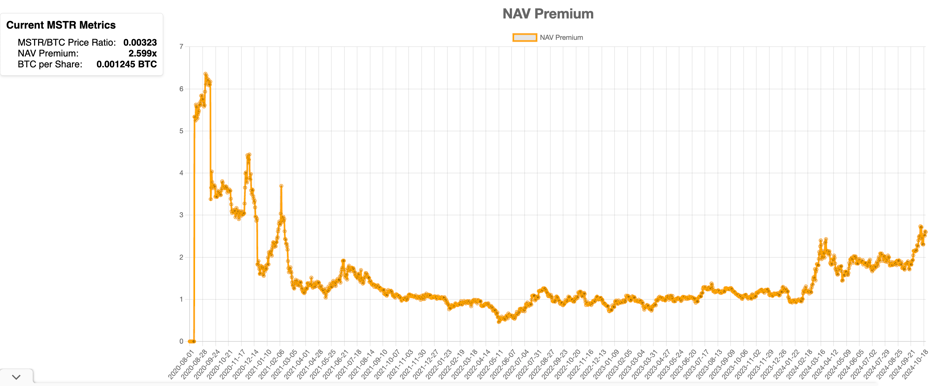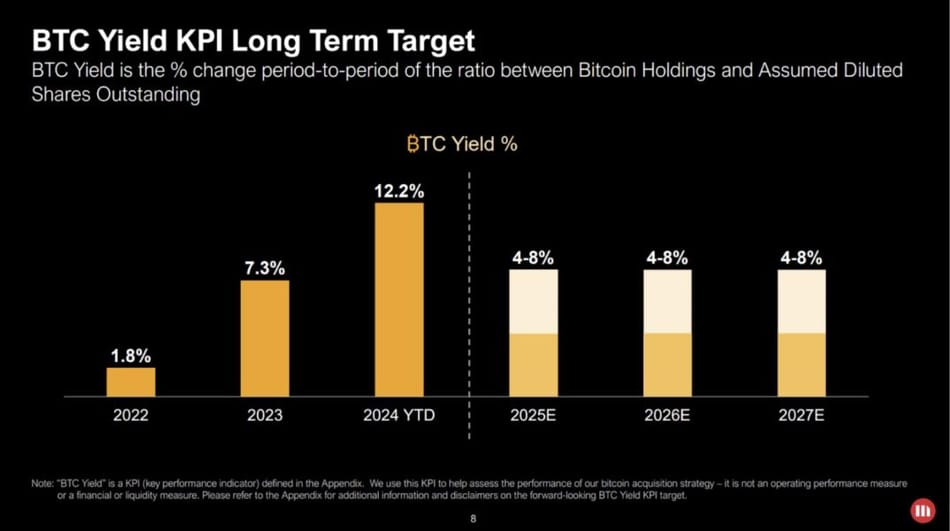Author: 0xEdwardyw
- MicroStrategy's stock market value is 2.7 times higher than the value of its Bitcoin holdings, a phenomenon known as NAV premium.
- The company utilizes this NAV premium to issue more shares and uses the raised funds to purchase Bitcoin. Although issuing new shares typically dilutes shareholder value, in this case, the number of Bitcoins per share actually increases.
- MicroStrategy introduced the concept of "BTC Yield" to measure the growth of Bitcoin holdings per share.
- The company has achieved a 17% year-to-date BTC return this year and expects future BTC returns to remain between 4% and 8%, indicating a continued growth trend in Bitcoin holdings per share.
MicroStrategy and Michael Saylor
MicroStrategy was founded by Michael J. Saylor in 1989, originally as a company focused on business intelligence (BI) and analytics software. The company is dedicated to providing solutions for enterprises, utilizing advanced analytics, reporting, and decision support tools to help organizations deeply analyze operational data for data-driven decision-making.
As a key figure in the technology and business intelligence fields, Saylor has led MicroStrategy through multiple growth and innovation phases in the BI industry, maintaining its leading position in the field. However, a historic turning point for MicroStrategy occurred in 2020 when the company decided to shift its focus to Bitcoin.
In August 2020, MicroStrategy announced its first acquisition of 21,454 Bitcoins for $250 million as a strategic investment. Saylor and the management team believed that Bitcoin is a superior store of value compared to cash, especially in the context of rising inflation and the risk of fiat currency devaluation. Since then, MicroStrategy has transformed from a pure software company into a corporate leader with Bitcoin as a financial asset. The strategy of borrowing through various capital market tools and investing in Bitcoin has made MicroStrategy's stock one of the best-performing stocks in the market.
MicroStrategy's Net Asset Value (NAV) Premium
As of October 2024, MicroStrategy holds approximately 244,800 Bitcoins, with an average cost of about $38,585 per Bitcoin, totaling an investment of approximately $9.45 billion. The market value of these holdings has exceeded $16 billion, indicating that its Bitcoin investment has achieved a return rate of over 1.6 times.
Despite the value of MicroStrategy's Bitcoin holdings exceeding $16 billion on the balance sheet, the market value of the company's stock is far higher. As of October 2024, MicroStrategy's market capitalization on the U.S. stock exchange has surpassed $44 billion, approximately 2.75 times the value of its Bitcoin holdings.

Net Asset Value (NAV) Premium
MicroStrategy's NAV premium refers to the ratio of the company's market value to the value of its Bitcoin holdings, reflecting the premium investors are willing to pay for MicroStrategy stock relative to the intrinsic value of its Bitcoin assets.
As of late October 2024, MicroStrategy's NAV premium has reached approximately 2.7 times its Bitcoin holdings, marking the highest level since February 2021. This indicates that investors value MicroStrategy significantly higher than the value of its Bitcoin assets.

This premium may be attributed to two reasons. First, although MicroStrategy's business focus is on Bitcoin investment, its software business also generates positive cash flow, approximately $12 million in 2023. While this cash flow is relatively small compared to the massive scale of Bitcoin investments, it provides some business support for the company. Second, investors hold optimistic expectations for Bitcoin price increases, which may reflect a potential increase of over 100% in valuations, thus driving the company's stock to exhibit a 2.75 times premium relative to the value of its Bitcoin holdings.
Bitcoin Securitization Strategy
Securitization is a financial engineering method that transforms assets or asset portfolios into tradable securities to realize value. In traditional finance, this typically applies to mortgages and loans, "securitizing" the future cash flows of assets into bonds, stocks, or other financial products, which are then sold to investors. Investors receive returns based on the performance of these financial products' underlying assets.
In the context of Bitcoin, securitization means using Bitcoin holdings as the underlying asset. The company issues securities (such as bonds, stocks, or convertible debt) backed by its Bitcoin holdings, indirectly exposing investors to Bitcoin's performance.
MicroStrategy holds billions of dollars worth of Bitcoin on its balance sheet and considers it "permanent capital," meaning the company has no intention of selling these Bitcoins.
MicroStrategy uses its Bitcoin holdings as collateral to issue convertible bonds. Convertible bonds are a type of debt that can be converted into company stock under specific conditions. The company uses the funds raised from these bonds to purchase more Bitcoin, further increasing its holdings.
In addition to debt instruments, MicroStrategy also raises funds by issuing stock, leveraging its market NAV premium (the difference between stock market value and Bitcoin holdings value).
"Money Printing Machine" Strategy Utilizing NAV Premium
MicroStrategy's stock premium is 2.7 times the value of its Bitcoin holdings, meaning when the company issues new shares, investors are willing to buy these shares at a price 2.7 times higher than their actual Bitcoin holding value. For example, one share corresponds to one Bitcoin, but the market prices it as equivalent to 2.7 Bitcoins. When the company issues a new share, it can raise cash equivalent to 2.7 Bitcoins and use these funds to purchase 2.7 Bitcoins. As a result, the total Bitcoin support for 2 shares will be 3.7 Bitcoins, increasing the Bitcoin holdings per share from 1 to 1.85.
Here are the detailed steps:
1. Current Situation:
- Shares: 1 share outstanding
- Bitcoin Holdings: 1 Bitcoin
- Market Valuation: Due to the premium, the market values the share as equivalent to 2.7 Bitcoins
2. Issuing New Shares:
- New Share Issuance: MicroStrategy issues 1 new share
- Funds Raised: The company raises cash equivalent to 2.7 Bitcoins from the new share issuance
3. Purchasing More Bitcoins:
- Using the Proceeds: The company uses the cash from 2.7 Bitcoins to purchase an additional 2.7 Bitcoins
- New Bitcoin Holdings: 1 + 2.7 = 3.7 Bitcoins
4. Post-Issuance Share Count:
- Total Shares: 2 shares outstanding (1 original + 1 newly issued)
5. Bitcoin Holdings Per Share:
- Bitcoin per Share: Total Bitcoin holdings of 3.7 Bitcoins ÷ Total shares of 2 = 1.85 Bitcoins/share
By issuing new shares at a price 2.7 times higher than the actual Bitcoin value per share, MicroStrategy effectively increased the Bitcoin holdings per share. This strategy leverages investor optimism and premium valuation, not only increasing the support value of Bitcoin per share but also enhancing the value of existing shareholders' Bitcoin assets.
Surprisingly, although issuing new shares typically dilutes shareholder equity, MicroStrategy achieved an actual increase in Bitcoin holdings per share due to the premium issuance. The key is that the new share price exceeds the net asset value (NAV) per share, and the funds raised for purchasing Bitcoin exceed the dilution effect, effectively enhancing the Bitcoin support value per share.
Maximizing Bitcoin Holdings Per Share and "BTC Yield"
MicroStrategy plans to maximize Bitcoin holdings per share by issuing more capital against its Bitcoin holdings and using the funds to purchase more Bitcoin. The company introduced the concept of "BTC Yield" to measure the returns brought to shareholders by its Bitcoin strategy. Although referred to as "BTC Yield," it does not represent traditional earnings (such as interest or dividends) but rather indicates the company's financial operations using Bitcoin holdings to raise capital, increase Bitcoin holdings, and enhance the relative value of the stock against Bitcoin reserves, thereby increasing shareholder stock value over time.
BTC Yield reflects the growth of MicroStrategy's Bitcoin holdings. When the company issues equity or debt under favorable conditions and uses the raised capital to purchase Bitcoin, the Bitcoin holdings per share increase, leading to growth in shareholder value.
BTC Yield measures the growth of Bitcoin holdings per share, specifically the percentage change in the ratio of the company's Bitcoin holdings to the diluted number of outstanding shares, visually demonstrating the change in Bitcoin quantity per share over time.

As of the latest report, MicroStrategy achieved a 12% BTC Yield in 2024 (according to Michael Saylor's recent interview, the BTC Yield has reached 17% this year). This data indicates that the company has increased Bitcoin holdings per share, thereby enhancing shareholder value. The company expects future BTC Yield to remain between 4% and 8% over the next three years, suggesting that shareholders' actual Bitcoin holdings may continue to increase.
Conclusion
MicroStrategy maximizes Bitcoin holdings per share through financial engineering. The company leverages its Bitcoin holdings to raise funds through the premium on bond and stock issuance, continuously reinvesting the returns into Bitcoin.
The success of this strategy relies on the long-term appreciation of Bitcoin. If Bitcoin prices continue to rise, MicroStrategy can continue to issue capital at a premium and reinvest in Bitcoin, further enhancing Bitcoin holdings per share.
However, if Bitcoin prices stagnate or decline significantly, the value of the company's holdings will be adversely affected, and the market may lose confidence in the company's ability to generate returns through Bitcoin investments. This could lead to a decline in stock prices, reducing equity premiums and making it difficult for the company to issue new capital under favorable conditions.
免责声明:本文章仅代表作者个人观点,不代表本平台的立场和观点。本文章仅供信息分享,不构成对任何人的任何投资建议。用户与作者之间的任何争议,与本平台无关。如网页中刊载的文章或图片涉及侵权,请提供相关的权利证明和身份证明发送邮件到support@aicoin.com,本平台相关工作人员将会进行核查。




